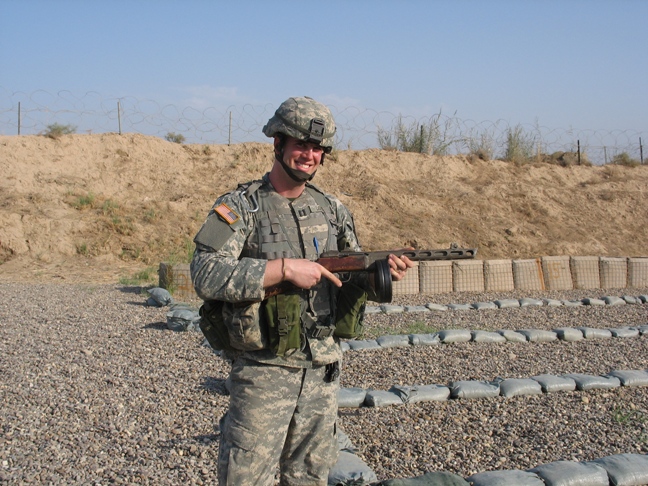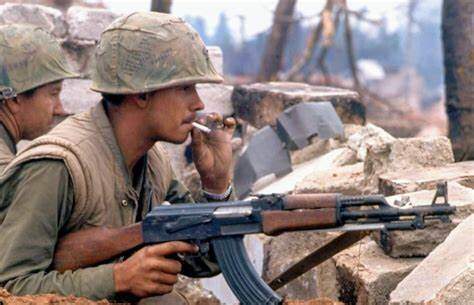agincajun Supporter
Hmmm, these guys look remarkably similar to the toy soldiers I used to play with when a younger kid, nice addition though, I’ll take anything from the SEA campaign.
Cajun ![]()
Hmmm, these guys look remarkably similar to the toy soldiers I used to play with when a younger kid, nice addition though, I’ll take anything from the SEA campaign.
Cajun ![]()
It was still prevalent enough that it was taught in the weapons portion of the Q Course in '82.
If the odds were 4:1 how did we lose? ![]()
Let’s hope they will do a whole squad of North Vietnamese to fill out some dioramas.
1 reply“You will kill ten of us, we will kill one of you, but in the end, you will tire of it first.”
― Ho Chi Minh
Ain’t it the truth!
Speaking of the PpSh-41…

That was one of my favorites to shoot.
Be that as it may, I find this to be a lackluster effort from Masterbox. The bandoleers are all wrong and they half-assed the Marines. I like the dynamic poses, but they look way too much like extras in a Vietnam B-Movie.
I don’t think the jungle fatigues were worn past Vietnam. If you want pre-BDU '80s troopers, i.e. OG107 Fatigues, I think a better starting place is the newish Tamiya US Infantry Scout Set (35379).
By changing out the boots w/straight leg boots and reworking the suspenders into H-style, adding new ammo pouches and M16A1s w/30 magazines, adding helmets w/covers and you will have figures in what will pass for OG107 Fatigues in field jackets and field gear. For '70s figures, just use M14s. That is what I plan for figures in '70s - '80s OG-107 Fatigues anyways.
2 repliesDamn, you’re an OG. ![]()
I went through Basic Training in July of ‘85, and we had guys from the 3rd Ranger Batt come down to see if anyone wanted to volunteer for the Ranger Regiment and they were wearing the green jungle fatigues with black berets. I recall the top pockets of the blouse were slanted. Sharp looking uniform.
As you can see from the posts, that’s an open ended question. I served in an ARNG unit as 11B from 80 to 85, in that time span we transitioned from the OG107’s to BDU’s, RVN era web gear to ALICE gear, 20 to 30 rd magazines. Still had black leather boots w/“herringbone” soles, steel helmets with cammo covers, VN era M-16’s…our flak jackets were the high collar non Kevlar type. Cammo field jackets arrived after the BDU’s so there was an old/new mix for a while ( I still had an OG field jacket w/yellow US ARMY that I was issued in 1967.) So it could be a real mix of uniforms because some Guard units got newer stuff faster than others. Jungle fatigues and boots were not authorized in my unit, but I did see them from time to time when we trained with guys from other states.
Another option is the MiniArt US Soldiers Rainwear set (35245). The three soldiers in ponchos can become any era by changing out their boots, weapons, and helmets. The poncho hasn’t really changed since its inception. Changing to straight leg boots and M14s and they are '50s/'60s troops stateside or in Europe. New boots with camo covered helmets and M16A1s w/20 rd mags and they are '60s - early '70s troopers. New boots with camo covered steel pot helmets with M16A1 w/30 rd mags and they are early '80s troopers. New boots with camo covered Kevlar helmets with M16A1 w/30 rd mags and they are late '80s troopers. New boots, Kevlar helmets and M16A2 and they are '90s troopers. Etc., etc., etc… The possibilities are endless.
The two guys in raincoats could be updated to about the '50s with straight leg boots, M14s, and new helmets as well. The raincoat was used up until that timeframe.
Is the figure NVA or VC? Not all VC wore black pajamas. VC used anything they could find. I read somewhere that US troops encountered an MP-38 (Germans sold them to the Chinese, Mao took them over, gave them to Ho. ) French stuff , WW2Japanese, WW2 US (from ARVNs), old Soviet/ Chicom. Figures are not my forte, but … porter has an M-1 carbine (French US, ARVN). Bike has a M-1 Garand (ARVN), M-16 (US/ ARVN), Nagant (Soviet or Chicom) . On back are a 1911A1 and a Tokarev.
In 1970, the most common NVA/VC weapons we captured were SKS and AK, also scary number of M16’s. Unit had a locker of some earlier finds, a French MAT 49(?), Swedish K, and some US M1 and M2 carbines. One of the M2’s had a cut down barrel, we fired the thing…nasty barrel rise, muzzle flash was horrendous, difficult to keep anywhere near target…lousy weapon. The K gun was nice weapon, didn’t fire the MAT.
2 replies@HeavyArty thank you for the recommendations. I have this what if dio for a 1980s red dawn inspired scene that i have the vehicles for but not the figures.
I actually had a trophy SKS (or what ever the Chicoms called them ). Part of the stock was discolored (blood stained?) Damn accurate , at least with my skills. Only issue (I found out at the range.) was the chamber was pitted. Fire it and the brass of the shell case molded to the pits and it would not cycle. Had to wang on the bolt handle with a wrench to get it to eject. Great single shot rifle. Moderately faster than my 1863 Springfield.(repro)
1 replyChicom Type 56 carbine was the official nomenclature of the SKS rifle. Then the Type 3 AK47 was also called the Type 56 Rifle.

Most of the SKS’s we picked up were Chinese, now and then a Soviet or Eastern Bloc one would turn up, they seemed to be better made. A properly functioning SKS was a very effective weapon.
Speaking of Vietnam-related topics, YouTube suggested this in my feed yesterday:
I really appreciate that suggestion. I’ve been pondering how to make 1970’s-1980’s pre-BDU soldiers in Europe and I didn’t really consider the newer WWII offerings.
One can always put your new figure desires in the “2024 Wish List.” With 2024 about 2/3rds over, there is still time to wish for new figure kits that hopefully figure manufacturers and sculptors will read.
With 3-D design and printing, perhaps the time to make new kits is less. Already we’ve been surprised by new figures, AFVs, weapons, and accessory kits that used to take years to design and make but now take a much shorter time to make and release.
So wish away!
1956 was the adoption date of the SKS into the PLA; I can assume that shipments of these arms started pouring by 1964 into North Vietnam, since China was the biggest supplier of arms to the North Vietnamese.